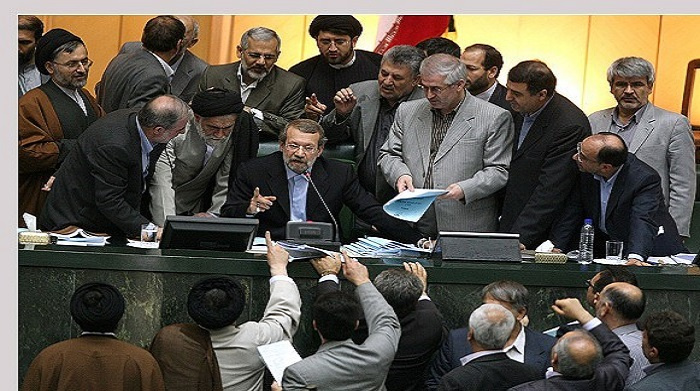Iran’s Tenth Majlis Is as Diverse as a Rainbow

When MP Sakineh Almasi’s rainbow address, made on the first day of the tenth Majlis, was virally made fun of, few got the real joke. It might be time for the two main political parties that have so far been trying to pretend victory, to celebrate the diversity of the ‘house of the nation’ and start to work together.
Iran’s parliamentarians made their final decision on who will lead the Majlis in the year ahead. Following a preliminary election in which Mohammadreza Aref was bitterly defeated by Ali Larijani with a large margin of about 70 votes, the MPs faced an easy choice when Larijani and reformist Mostafa Kavakebian ran for Speaker. Kavakebian tried to withdraw his claim just after the voting process started but it was too late. He only won 11 votes while Larijani was elected by an absolute majority of 237 votes, collecting about 60 more votes compared with the preliminary election held earlier this week. Though Larijani’s speakership, interpreted by principlist media as a sour defeat handed to the reformist camp, almost went without saying after the preliminary elections, the outcome of the election for the other two top posts of vice speakership proved otherwise. Massoud Pezeshkian and Ali Motahari gained 158 and 131 votes and became the first and second vice speakers, respectively.
Pezeshkian, a formerly disqualified presidential candidate and healthcare minister during Mohammad Khatami’s second presidential term, secured more than half of the votes cast by his colleagues. He is often hailed for a “fiery” address in which he implicitly alleged the principlist camp for injustice and intolerance in the events following a controversial presidential election in 2009, generally called “sedition” by the principlists. Motahari, son of a very prominent Shiite cleric, preacher and theorist whose martyrdom anniversary has been the official Teacher’s Day in Iran, has now become an independent voice, popular for many of his bold positions. He is perhaps best known for his repeatedly voiced advocacy of an impartial trial for the dissident leaders who are under house arrest since 2011, following protests after the disputed presidential election in 2009, together with then President Mahmoud Ahmadinejad. One of his heated addresses on the ninth Majlis’ floor got his microphone turned off and ended up in a physical fight. His stance on the issue of hijab and the likes of it indicates his roots in principlism but his pursuit of human and civil rights has given him a trademark of honesty, giving rise to his popularity in public and in political circles. His name was also included in the reformist-moderate coalition’s Tehran list proposed for the Majlis, which won every single seat available in the February election in Tehran.
The line-up of the parliament’s twelve-man board of governors now includes seven principlists and five MPs from the so-called ‘Hope’ bloc. If Aref had not stepped aside, that could have been be a tie. Aref’s refusal to run in the election together with his announcement that he will join the education committee is interpreted by many as yet another failure of the reformist camp to put forward new leaders.
Nevertheless, the apparent defeat has a good omen in hiding. Mohammad Ghassim Osmani became the first Sunni MP ever to be elected into the board of governors. On the darker side of yesterday’s elections, however, were women. Despite their record number in the tenth Majlis, they did not succeed in climbing up. The only female candidate was Soheila Jelodarzadeh from the reformist camp. There is one female lawmaker for almost every 17 men.
Worse came the final decision on Minoo Khaleghi, the Isfahan elect who was disqualified after the election by the Guardian Council. The case has sparked differences between the interior ministry and the orthodox council and was relegated to the high council for dispute settlement among branches of the government. An MP told media yesterday that the council has voted in favor of the Guardian Council. Minoo Khaleghi’s post-election disqualification is reportedly based on unconfirmed photos featuring her without the Islamic dress code, hijab. Ali Motahari has warned to initiate impeachment of the interior minister if the ministry fails to submit her credentials to the Majlis.
The principlists’ reaction can shed light on the nature of the parliament. Lawmaker Naghavi Hosseini has told Jame Jam Online that 180 principlists who participated in a Velayat bloc’s recent assembly had vowed to vote for its list. “How come our candidates won 130 votes, where did the other fifty votes go?” he said. The inappropriate performance of the bloc requires changes in the year to come if it wants to change the board of governors, he added.

